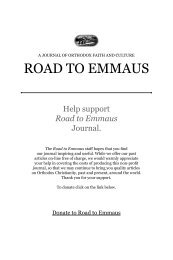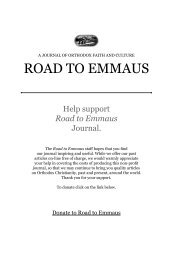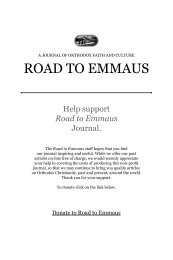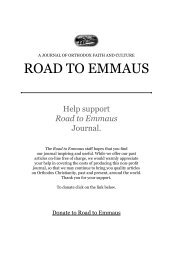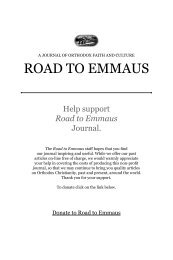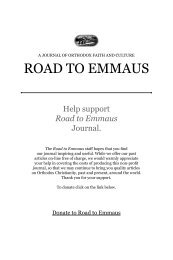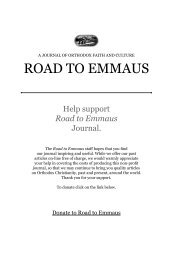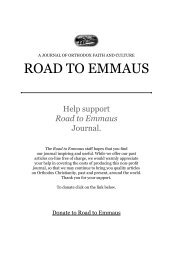RTE No 20 Interior - Road to Emmaus Journal
RTE No 20 Interior - Road to Emmaus Journal
RTE No 20 Interior - Road to Emmaus Journal
Create successful ePaper yourself
Turn your PDF publications into a flip-book with our unique Google optimized e-Paper software.
<strong>Road</strong> <strong>to</strong> <strong>Emmaus</strong> Vol. VI, <strong>No</strong>. 2 (#21)her blessing. Although my father died when I was very young, his pho<strong>to</strong>graphis in the living room and I also bow in front of him <strong>to</strong> ask for a blessing.SYMEON: Before our marriage we both did that.ELESA: Yes, it was very important <strong>to</strong> my family that we asked his blessing.We lit a little wick lamp that burns ghee before my father’s picture <strong>to</strong> showour respect.These things are woven in<strong>to</strong> our lives, and Indians do this with their neighborsas well. Our neighbors are considered as aunts and uncles, so if I’m going<strong>to</strong> do something special I also ask for their blessings. With this constant interactionyou feel yourself <strong>to</strong> be part of a huge family. Also, your neighbor is no<strong>to</strong>nly the person next door, he can be someone who lives five blocks away.In an Indian house the doors are always open. People come in at any time.You don’t have <strong>to</strong> announce yourself, you don’t have <strong>to</strong> call and ask if youcan come. Hospitality is always offered; the door is open and you are welcomedwith open arms, day or night.We also don’t have a sense of privacy as Americans think of it. I supposeyou could go in<strong>to</strong> a separate room, lock yourself in and do whatever youwant, but it would be thought unusual. The idea is <strong>to</strong> not really have a “private”life because it is seen as unnecessary. My parents felt that this kind ofcommunity was not possible in the United States.<strong>RTE</strong>: And the house was built <strong>to</strong> accommodate this hospitable lifestyle?ELESA: Yes. All houses have a front door and a back door. You almost alwaysuse the back door. The front door is only for very important occasions –weddings, funerals, or greeting someone you haven’t seen for a very longtime. It is formal, like a domestic version of the royal doors in an Orthodoxchurch. The back door is used for everything else. When you enter the gateof my grandfather’s house, the front door is open before you with a secondgrill-work door behind it that remains closed except on formal occasions. Ifyou were <strong>to</strong> enter the house by this door you would find yourself in a commonroom that has other rooms branching off of it.The “back door,” that we use most of the time, isn’t a door at all, it’s a largegate that stands open all day long. You just walk in. There is a small courtyardwith a little sink where you wash your feet before entering the house.(This is very important. In India you never enter someone’s house with yourshoes on, no matter what religion you are – Jain, Hindu, Christian, or6 Evening prayers with bells and lamps (Svetambara).



